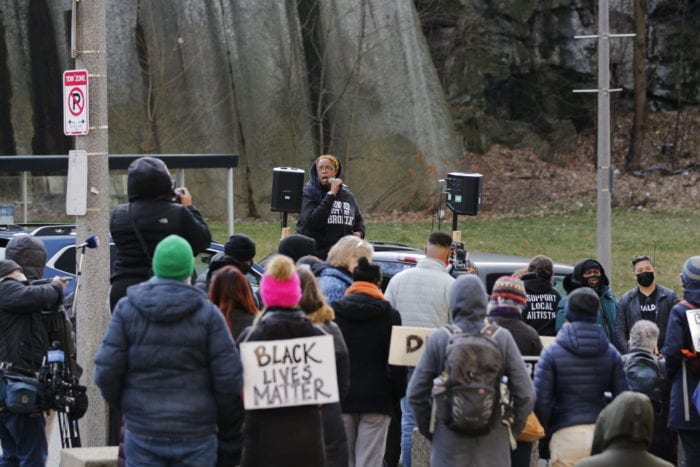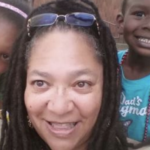
“You know there is work to do when the marches and protests are over.”
The initial plan was for Black Lives Matter supporters to gather at Madison Park High School in Roxbury, and then to march downtown to the Massachusetts State House. But sometime over the weekend prior to Martin Luther King, Jr. Day, Violence in Boston organizer Monica Cannon-Grant heard from allies and accomplices who had learned of apparent threats.
Violence In Boston is a successor to the work of the radical root-cause prophet Rev. Dr. King, and Cannon-Grant, its founder and executive director, had called for the MLK Day rally and march following the white nationalist-led riot in DC on Jan 6. So she wasn’t going to let threats from those same people stop her group from gathering. They wound up staying in Roxbury instead of marching downtown, but they still showed up.
People started arriving at around 2pm, with participants including former Boston City Councilor and 2017 mayoral candidate Tito Jackson on hand to help fire up the crowd. He spoke of the disparities Rev. Dr. King rallied people to confront in his era, and that Black Lives Matter activists face five decades later. Quoting from the Federal Reserve Bank’s “Color of Wealth” study, Jackson spoke of the shocking inequities around here: among them, “a white man’s lifespan in the South End, just a mile-and-a-half away from Madison Park High School, is about 30 years longer than the average Black man’s.”
Jackson and others encouraged people to get involved in the work that organizations like Violence in Boston are doing to eliminate disparities from Black lives. “Last year, since COVID, Monica and her team made and distributed over 80,000 meals,” Jackson said. “People are hungry, out of work, and she’s meeting them at their needs.”
Kirsten Halbert, an activist in attendance, said, “I refuse to look out with a deficit mindset. How could we move forward? My family found the resources to move through slavery, the Civil War, and Jim Crow. Ingenuity, creativity, and faith—not only in God, but in each other—carried us forward.
“I’ve been a supporter of Violence In Boston since it was a social media campaign that let folks know where the violence is to now, today—a full-fledged movement that demands we stand up and do something about violence in Boston. You know there is work to do when the marches and protests are over and the sound trucks and camera crews leave. Mutual aid work, organizing for policy changes, and the advocacy work that requires an enormous amount of follow-up and follow-through efforts.”
“As VIB (Violence in Boston) and BLM Boston are both community organizers who we admire and whose missions are in line with those of Dorchester Art Project and our nonprofit Brain Arts Org,” said Sam Potrykus of Dorchester Art Project. “We are always happy to assist by lending our sound system and truck to actions that raise awareness and fight for BIPOC liberation and advocate for the dismantling of white supremacy everywhere.
“I think it’s critical for artists in particular to be part of the movement and I suggest all allies and accomplices find a way to plug in immediately, however you can.”
As a child of the 1960s, it gave me a feeling of great pride and dread standing next to the stage as Cannon-Grant spoke. She echoed her own mama and others who have instructed, “Don’t you hit anybody first, but if they come for you, hit them back,” and announced that more than 30 supporters have taken the requisite courses to prepare for armed self-defense. This is very courageous talk, but real talk is necessary when facing down fascists and their threats.
As Eric Mann of the Community and Labor Strategy Center noted in his 2021 annual MLK Day essay: “When I worked with CORE and allied with SNCC In 1964-1965 they were known as the Black militants, and yet both organizations saw themselves, at the time, as non-violent. … Everyone we challenged in ‘the white power structure’ saw militant, non-violent direct action as a big threat and retaliated accordingly. Very few at the time praised King for his ‘moderation.’”
Also on hand in Roxbury was Andre Francois, president of the Boston School Bus Driver’s Union. “The late Chuck Turner involved us in action for social justice over thirty years ago and we never stopped. I’ve been [union] president for about six years,” he said. “USW Local 8751 has over 900 members. Close to 85% are Black or brown and of those many are Haitian nationals. We are always on the front line when it comes to the education of the children of Boston. Our children, grandchildren, nieces, and nephews. Before this rally, we were at the Mass Action Against Police Brutality.”
Francois continued: “This rally was an intergenerational effort, as most successful protests often are. Geanier Moore, mother of Marnier Crockton, age 21, and Jordyn Saintil, age 9 explained why she brought her daughters to the rally. We need to stand up and protect Black women. Monica Cannon-Grant is standing on the stage, in front of all these people knowing she had to cancel the march because of threats. Black women always rise up. Jump to the forefront to protect our families and communities.
“Someone has to stand up for us. Tell the elected officials our agenda. We need our needs met just like every other community. All politics is local. We need our local agenda.”
Hopefully, people can see the just cause of the current movement for Black lives while it’s happening, and not just 50 years from now. It’s time for Boston to wake up. Black lives matter. It’s time to protect the women who put their bodies on the front lines day after day.
Zakiya Alake is co-chair of Bring Our Wealth Home and a MAAPL Board member. One of the first paralegals trained by a law school for radicals in the 1970s, she also advises the Boston Institute for Nonprofit Journalism on foreclosure issues and has been published in DigBoston.

